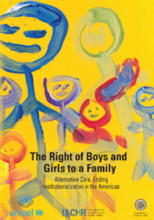Displaying 401 - 410 of 662
Infant Mental Health Journal has published an important Special Issue on Global Research, Practice, and Policy Issues in the Care of Infants and Young Children at Risk. This article describes a model of care for abandoned and neglected infants in need of urgent physical, social, and medical support as implemented by the Child's i Foundation, an international, nongovernmental organization operating in Uganda.
Infant Mental Health Journal has published an important Special Issue on Global Research, Practice, and Policy Issues in the Care of Infants and Young Children at Risk. This article provides a case study of a project to improve the health, safety, and development of children birth to 6 years old in a large orphanage in Nepal.
This report by the Inter-American Commission on Human Rights (IACHR) analyzes children’s right to live and be raised by their families, and establishes the resulting obligations for States when it comes to supporting and strengthening families’ ability to raise and care for their children.
In 2013, Better Care Network (BCN) initiated an important process of developing a new Strategic Plan identifying the main strategic focus for its work over the next four years (2014-2017). The plan is based on an analysis of BCN’s achievements to date, the strategic areas in which BCN can have most impact in the future by working with key actors to strengthen the response to children without adequate family care.
This position statement by Save the Children highlights the central place of families in numerous international legal instruments and how the concept has been understood. It also clarifies its own understanding of families and reviews key provisions under international law regarding their crucial role and responsibilities, and that of States towards them.
This important report documents a 22-month longitudinal study of the reintegration of children in residential care in Moldova.
A presentation on the "Orphan Industrial Complex" at the Young Lives and Globalization in Africa workshop at the University of Liège, Belgium on 21st February 2014.
This document presents key models used by Hope and Homes for Children (HHC) in Rwanda with regards to deinstitutionalisation and child protection system reform, particularly regarding closure of institutions, development of alternative care and prevention of family separation and institutionalisation.
This article reviews some of the language and conceptual issues that need to be addressed to be able to meaningfully compare differential usage of residential childcare services across national boundaries.
The Infant Mental Health Journal has published an important Special Issue on Global Research, Practice, and Policy Issues in the Care of Infants and Young Children at Risk. This article documents how between 2005 and 2013, the Government in the Republic of Georgia closed 32 large, state-run institutions housing children without adequate family care.





